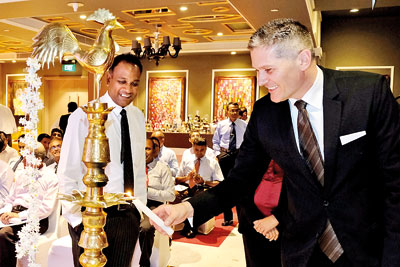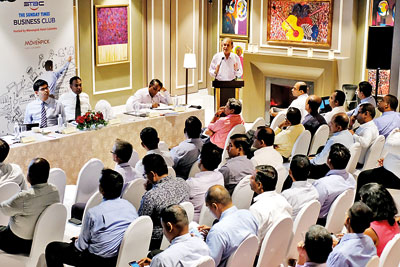Poll: Know your local candidate and exercise your franchise
Underworld figures and crooks engaged in illegal activity are among those nominated by some political parties to contest the forthcoming local government elections on Saturday February 10.

Movenpick GM George Koumendakos lighting the oil lamp.
“We have compiled a list of names of candidates and found that several underworld figures and corrupt businessmen engaged in illegal activity have been given nomination this time to contest the polls,” said the Executive Director of the People’s Action for Free & Fair Elections (PAFFREL) Rohana Hettiarachchi addressing the Sunday Times Business Club (STBC) meeting at the Movenpick Hotel at Kollupitiya Colombo 3 on Tuesday.
It was the first meeting of the STBC at its new ‘home’, Movenpick supported by NDB and the discussion was on: “Elections and new processes”.
Explaining the nitty gritty details of the local government polls, he said if a political party gets valid votes amounting to 40,000 and if 20 members are to be elected, the total valid votes have to be divided by the 20 members to get a figure of 2000 votes to elect one member.
“This is known as the qualifying number,” he said adding that the election looks like a national election as it had been delayed for two and a half years. “This is also the first election to be held by the present government that looks more like a referendum on the government. This is the first time that we are getting women’s representation that should be 25 per cent of the total quota.”
He said with the introduction of the new electoral system the voters will come to know of their representatives. Each electorate will have their own representative who will be compelled to deliver on their election pledges.
However the disadvantage of the system was that there is no preferential vote. He said the Colombo Municipality this time will have more than the double the number of members with support coming from businessmen.
Underworld
“It will also be a reflection on the people of an electorate when underworld figures are selected from an electorate.”
Mr. Hettiarachchi said following the election no party will get a majority of votes. This will be a disadvantage for smaller political parties as there are no bonus seats. However the system is good for democracy. This can also result in parties merging together.”
He said the biggest issue this time was bribing the voters. “Gas cookers, grinders, shoes, books, cement, wall clocks, diaries, etc have been distributed. The matter will be brought to the notice of the Commissioner General of Elections. We have reported 47 cases of government vehicles and state buildings being used for election related work,” he said, adding: “We salute the police, the election commission and state officials this time for their dedication.

Discussion in progress. Pix by Amila Gamage
Member of the Election Commission and the former Legal Draftsman, Nalin Abeysekera said from 1947-1977 the municpal elections in Sri Lanka was held where every municipality was divided into wards and the candidates were not nominated by a political party but was proposed by a resident of the ward. The ballot paper only indicated the name of the person and the symbol and not a political party.
The candidate who got the highest number of votes was elected to that ward. The most important thing was that there was a personal connection between the member and the voter. However this system was changed from 1977 with the introduction of the Proportional Representation system with no election to the ward.
Mr. Abeysekera said in 1987 the system was again changed when people could vote for a candidate nominated by the party by casting a preferential vote. The party that got the highest number of votes then elected the candidates submitted by the party. But the political party elected the Mayor and the Deputy Mayor of that municipality. The disadvantage of that system was that there was no link between the candidate and the voter. The voter did not know whom they should approach when there was a problem in the local government area.
Nicknames
“There was also inter party and intra party rivalry that led to violent incidents and when a vacancy occurred, it was filled by the party from the list of names submitted by them.”
He said the present system is called the mixed member proportional system which is practiced in New Zealand, Germany, Scotland and in South Africa in local government elections. The present local government amended law has prescribed that 60 per cent of the members to be elected by the first-past-the-post and 50 per cent to be elected under the proportional system. “If the nomination paper does not contain the required number of female representation, the nomination paper can be rejected.”
He said unlike in the previous years the votes this time will be counted at the polling stations.
Asoka Obeyesekere, Executive Director at the Transparency International Sri Lanka (TISL) said that the Election Commission has been mandated to decide on the women quota which is not going to be an easy task.
He said the people this time view the local polls as a national election as it is driven by political parties. Some candidates have even advertised themselves in the social media by their better-known nicknames to connect with voters in the area.
In a traditional first-past-the-post prior to 1977 people had an idea that a vote can be wasted. But under the new system the vote will be counted and ballot paper has been made easier.
On the other hand candidates are more concerned on the calculation of their votes, particularly from the lists, he said.


